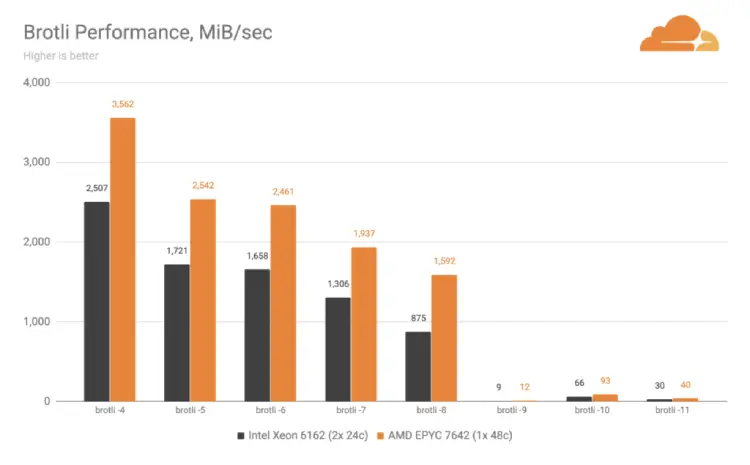
Cloudflare says it is building its next-generation stack on AMD CPUs, rather than the Intel chips that have historically powered its compute-intensive infrastructure – which serves on average 11 million HTTP requests per second
The announcement by San Francisco-based Cloudflare, which provides DNS resolution, content delivery and security services, is a major boost for AMD, which has been making progressively greater inroads on Intel’s dominance.
Cloudflare will be moving from a dual socket Xeon setup to a single socket Epyc 7642: core levels will be the same, but due to AMD’s lower power usage and higher performance, the new chips will handle more requests per Watt.
Cloudflare runs infrastructure in 200 cities across over 90 countries. The move follows head-to-head testing by the company of the CPUs, across data compression, power efficiency, cryptographic key generation, search performance and more.

As Rob Dinh, a data centre/hardware test engineer at the company explained today: “[We] get down to servers and their components to understand and select the best hardware to maximize the performance of our stack. Our software stack is compute intensive and is very much CPU bound, driving our engineers to work continuously at optimising… performance and reliability at all layers of our stack.”
See also: AMD EPYC Rome Launch: The Specs, the Reaction to the new 7nm CPUs
Dinh added: “As we started looking at production ready systems to power our Gen X solution, we took a long look at what is available to us in the market today and we’ve made our decision. We’re moving on from Gen 9’s 48-core setup of dual socket Intel Xeon Platinum 6162’s to a 48-core single socket AMD EPYC 7642.”
Performance benchmarking our new Gen X CPUs. Intel no longer inside. #epyc https://t.co/k48u3GKofE
— Matthew Prince ? (@eastdakota) February 25, 2020
Explaining the company’s targets, he said: “Our main defining metric is Requests per Watt. We can increase our Requests per Second number with more cores, but we have to stay within our power budget envelope. We are constrained by the data centers’ power infrastructure which, along with our selected power distribution units, leads us to power cap for each server rack. Adding servers to a rack obviously adds more power draw increasing power consumption at the rack level. Our Operational Costs significantly increase if we go over a rack’s power cap and have to provision another rack. What we need is more compute power inside the same power envelope which will drive a higher (better) Requests per Watt number – our key metric.”
After putting the two through a range of tests, Dinh said that overall they revealed “a single EPYC 7642 to be more competitive than two Xeon Platinum 6162. While there are a couple of tests where AMD loses out such as OpenSSL AES-128-GCM and Go OpenSSL ECDSA-P256 Sign, AMD wins in all the others. By scanning quickly and treating all tests equally, AMD does on average 25 percent better than Intel.”
“With the server, a straightforward solution for increasing computing power is to have more CPU cores. The more cores we can include in a server, the more output we can expect. This is important for us since the diversity of our products and customers has grown over time with increasing demand that requires our servers to do more.”
AMD remains a minnow alongside the whale of the chip world, Intel. AMD reported Q4 2019 revenues of $2.13 billion, and net income of $170 million. Intel’s figures were $20.2 billion and $6.9 billion respectively, the same quarter.






